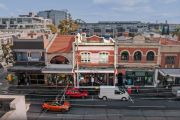
Political uncertainty bad news for Canberra investors: Raine and Horne
Commercial investors in Canberra are crying out for political clarity, according to Raine and Horne Commercial, with the possibility that recent strong rental performance could be reversed as business confidence suffers a blow.
The prospect of a hung parliament, in which one of the two major parties are forced to make concessions for independents of minor parties, is weighing heavily on capital city investors, says Nick Cotis, Raine and Horne Commercial Canberra director of operations – sales.
“We’ve been inundated with calls from our interstate and local owners concerned about how the ongoing political indecision will impact their office assets in Canberra,” Mr Cotis said.
Deals to relocate public service jobs to regional areas – as touted by deputy prime minister Barnaby Joyce during the election campaign – represent the biggest concerns of clients.
“Our institutional clients are worried the main political parties will be required to shift public sector agencies interstate as part of their negotiations with minor parties and independents,” Mr Cotis said.
“This will create a commercial office glut and long-term vacancy rates will blow out, with a consequent hit to yields also a distinct possibility.”
He said Canberra vacancy rates had been on a steady downward trend since Malcolm Turnbull took office in September last year – moving from 15 per cent to “around 12 per cent”.
“When Malcolm Turnbull took over last September, there was a surge in business confidence in Canberra,” Mr Cotis said.
“Government departments were looking to expand or move within Canberra, and we saw an almost immediate impact on the commercial markets.”
According to Raine and Horne Commercial, Canberra office yields currently sit at 6 per cent, if a property has a commonwealth government tenant on a long term lease, and 7-8 per cent for properties leased to private-sector businesses.
Mr Cotis predicted Canberra’s leasing figures would be the most susceptible to any ongoing political instability of all the Australian markets.
“Wherever you are in Australia, you need business confidence. However, political instability significantly impacts the Canberra commercial property market,” he said.
Mr Cotis’ comments follow a statement from the Property Council of Australia urging both parties to avoid political deals which could have long-term consequences for the economy.
“Our message to both sides is learn the lessons from 2010. Make no deals that sacrifice Australia’s long-term economic interests,” Property Council chief executive Ken Morrison said.
“Business never likes uncertainty, but we accept that it is the voters’ prerogative to choose the parliament that best reflects their hopes and aspirations.
“This result is a reflection of the people’s will and it has to be accepted as that.”
The property industry would work with the government eventually formed.
“Our hope is that we end up with a workable Parliament that can deliver the stable government that Australia needs,” Mr Morrison said.
“The property industry will work with whatever party forms government and the rest of the Parliament.”










